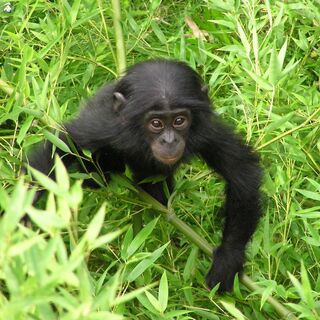Altruism
Why Do We Share?
Food sharing with strangers might be unique for humans.
Posted November 6, 2020 Reviewed by Devon Frye
When I was a child, we used to listen to a song called "Sharing is Fun," which was all about how we can enjoy things better when we share them. I was not always sure I agreed, particularly when it came to sharing my snacks with my two brothers.
But in general, the old German children's song seems to be true—at least for humans. We altruistically share food: in both hunter-gatherer and industrialized societies, there are customs and institutions to provide needy people with food, even when it is scarce and the donator needs the food themselves (Tomasello 2019).
Infants do this too. It has been well established that they share rewards equitably after collaboration. In a study in Leipzig, three-year-old children were presented with a task in which they had to pull a board with an unequal amount of sweets on either end. If there were five jellybeans on one side of the board and only one on the other side, the children would divide the treats so that everyone got the same amount. These sharing behaviors were especially strong if the children had worked together before (Hamann et al. 2011).
In a very recent study, it turned out that kids as young as 19 months will already share food with a stranger. The tested infants witnessed an experimenter pick up a desirable fruit, “accidentally” dropping it out of reach. When the experimenter tried to reach for the dropped fruit with his outstretched arm, these little kids handed over the fruit, surprisingly even if they were hungry themselves (Barragan et al. 2020).
What about animals? It is well known that social carnivores like wolves or meerkats provide their offspring with food, but this is probably an innate behavior that can be explained by kin selection. But what about sharing with less related or unrelated group members, or even strangers? Let us define food sharing here as a situation where the resource owner shows tolerance and allows a partner animal to consume a part of her food, although she has the ability to fight and try to keep all of her food (Hadjichrysanthou & Broom, 2012).

Chimpanzees, for example, do share food with each other. However, compared to humans, there is a difference in terms of with whom, why, and how chimpanzees share (usually not actively and usually not fairly). When chimpanzees hunt monkeys, not only the hunters get portions of the meat but bystanders do as well (Boesch 1994). Thus, chimpanzees share independently of the effort each individual invested in the cooperative hunt—in contrast to the above-mentioned children who worked together to pull a board.
It seems that chimpanzees share food for three reasons: to avoid costly harassment from beggars (Stevens 2004), to enhance the welfare of closely related group members, and to strengthen social relationships with favored partners (Silk et al. 2013). Scientists have described sharing in chimpanzees as a passive process of selective relinquishment and have emphasized that the voluntary handing over of food is virtually absent. The best way to describe their sharing is tolerated theft (Tomasello 2019).

Bonobos, however, might be different. In the wild, they share food under many circumstances. It was also shown in an experimental study that these apes spontaneously handed conspecifics highly nutritious yummy food—they used nuts. They even carried these nuts several meters into the reach of the potential recipient, indicating that bonobos' food-sharing behavior really is intentional (Krupenye et al. 2018). In contrast, chimpanzees never handed over food in similar experimental studies. However, it is important to note that bonobos in that study only handed over whole nuts that could not be eaten without the use of a tool. Thus, there is no proof that bonobos would hand over immediately edible, high-value food items in their possession rather than eating it themselves.
So why is it that 19-month-old babies hand over food to strangers when other animals are more selective about sharing? This particular kind of food sharing is probably unique for humans. But from an evolutionary point of view, how does it make sense?
Engaging in such altruistic food transfer, instead of keeping the food, is costly because it reduces the caloric intake of the giver. Evolutionary scientists have explained human food sharing like this: by giving away food to strangers, individuals may promote partnership and group cohesion, thereby helping the species succeed within the dynamic environment of evolutionary adaptation. In an early step of evolution, we became “obligate collaborative foragers"—meaning that individuals were interdependent with one another and so had a direct interest in the well-being of others—even when they were non-kin (Tomasello et al. 2012).
So here’s the secret that even infants know: sharing isn’t always fun, but it is fundamental.
References
Barragan, R. C., Brooks, R., & Meltzoff, A. N. (2020). Altruistic food sharing behavior by human infants after a hunger manipulation. Scientific Reports, 10(1), 1785.
Boesch, C. (1994). Cooperative hunting in wild chimpanzees. Animal Behaviour, 48(3), 653-667.
Hadjichrysanthou, C., & Broom, M. (2012). When should animals share food? Game theory applied to kleptoparasitic populations with food sharing. Behavioral Ecology, 23(5), 977-991.
Hamann, K., Warneken, F., Greenberg, J., & Tomasello, M. (2011). Collaboration encourages equal sharing in children but not chimpanzees. Nature, 476, 328-331.
Krupenye, C., Tan, J., & Hare, B. (2018). Bonobos voluntarily hand food to others but not toys or tools. Proceedings of the Royal Society B: Biological Sciences, 285(1886), 20181536.
Silk, J., Brosnan, S., Henrich, J., Lambeth, S., & Shapiro, S. J. (2013). Chimpanzees share food for many reasons: the role of kinship, reciprocity, social bonds and harassment on food transfers. Animal Behaviour, 85(5), 941–947.
Stevens, J. R. (2004). The Selfish Nature of Generosity: Harassment and Food Sharing in Primates. Proceedings of the Royal Society of London B Biological Sciences, 271(1538), 451-456.
Tomasello, M. (2019). Becoming Human: A Theory of Ontogeny. Cambridge (Massachusetts): Belknap Press.
Tomasello, M., Melis, A. P., Tennie, C., Wyman, E., & Herrmann, E. (2012). Two key steps in the evolution of cooperation: The interdependence hypothesis. Current Anthropology, 53(6), 673–692.


